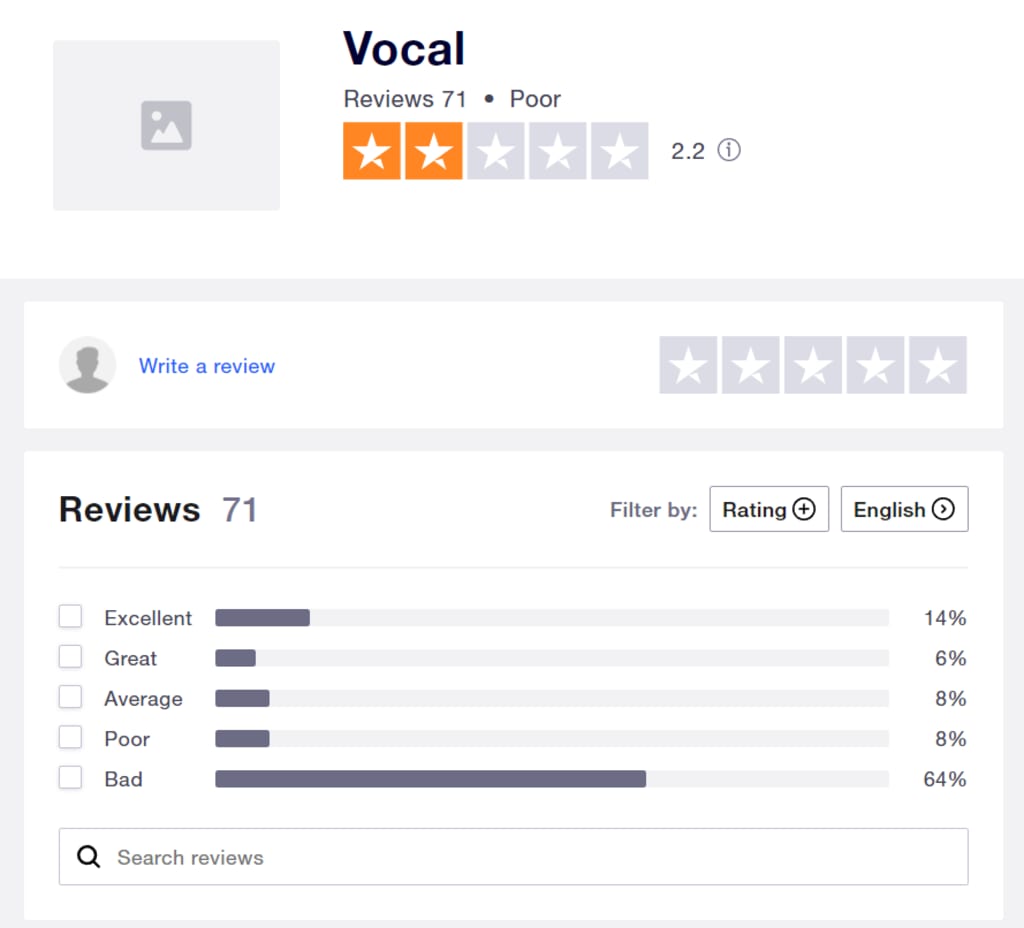
Title: The Ineffectiveness of Vocal Media: A Critical Analysis
Introduction (100 words):
In the age of digital content creation, platforms like Vocal Media have emerged as avenues for writers and creators to share their work. However, despite its popularity and promises of exposure and earnings, there are several reasons why Vocal Media can be considered largely ineffective. This article delves into the limitations and drawbacks of the platform, shedding light on its shortcomings and the challenges faced by content creators in achieving meaningful success.
Limited Exposure and Reach (200 words):
One of the fundamental issues with Vocal Media is its limited exposure and reach compared to more established platforms. While Vocal Media claims to offer exposure to a large audience, the reality is that the platform's user base is significantly smaller than giants like YouTube, Medium, or even traditional publishing outlets. Consequently, the potential audience for one's content remains restricted, making it difficult for creators to gain significant traction or attract a substantial readership.
Lack of Monetization Opportunities (200 words):
Although Vocal Media offers a revenue-sharing model for creators, the monetization opportunities are often limited and not as lucrative as advertised. Earnings are primarily based on engagement metrics, such as views and engagement time, which can be challenging to achieve due to the platform's limited exposure. Moreover, the revenue-sharing model often leads to minimal earnings, making it difficult for creators to rely on Vocal Media as a sustainable source of income.
Quality Control Challenges (200 words):
Vocal Media's open submission policy allows anyone to publish content, which inevitably leads to quality control challenges. As a result, the platform becomes flooded with a wide range of content, varying significantly in terms of depth, accuracy, and overall value. This dilution of quality makes it harder for exceptional content to stand out, as the platform lacks the necessary curation or editorial oversight seen in other publishing outlets.
Lack of Niche Targeting (200 words):
For creators seeking a specific niche audience, Vocal Media falls short in providing effective targeting options. The platform's structure and algorithms do not allow for precise niche categorization, making it challenging to attract readers who have a genuine interest in a particular topic. As a result, content creators may find it difficult to connect with their target audience and build a loyal following, hindering the potential for meaningful engagement.
Limited Exposure and Reach (250 words):
The most significant drawback of Vocal Media is its limited exposure and reach. While the platform boasts of providing exposure to a large audience, the reality is that its user base is significantly smaller compared to established platforms like YouTube, Medium, or traditional publishing outlets. As a result, the potential audience for one's content remains restricted, making it difficult for creators to gain significant traction or attract a substantial readership. Without a substantial audience, it becomes challenging for content creators to generate meaningful engagement, receive feedback, or establish themselves as authorities in their respective fields.
Lack of Monetization Opportunities (250 words):
Monetization is a crucial aspect for content creators seeking to earn from their work. However, Vocal Media's monetization opportunities are often limited and not as lucrative as advertised. The revenue-sharing model relies heavily on engagement metrics such as views and engagement time. Achieving these metrics can be incredibly challenging due to the platform's limited exposure and user base. Consequently, creators often find themselves earning meager amounts, making it difficult to rely on Vocal Media as a sustainable source of income. Moreover, the revenue-sharing structure creates a sense of uncertainty as earnings fluctuate, leaving content creators in a precarious position.
Quality Control Challenges (250 words):
Vocal Media's open submission policy allows anyone to publish content, leading to significant quality control challenges. With minimal barriers to entry, the platform becomes flooded with a wide range of content that varies significantly in terms of depth, accuracy, and overall value. The absence of effective curation or editorial oversight further exacerbates this issue. Consequently, exceptional content struggles to stand out amidst the sea of mediocre or subpar submissions. This dilution of quality not only makes it harder for talented creators to gain recognition but also impacts the overall reputation of Vocal Media as a platform for quality content.
Lack of Niche Targeting (250 words):
Content creators often seek to connect with a specific niche audience. However, Vocal Media falls short in providing effective targeting options. The platform's structure and algorithms do not allow for precise niche categorization, making it challenging to attract readers who have a genuine interest in a particular topic. As a result, content creators may find it difficult to connect with their target audience and build a loyal following. This lack of niche targeting hinders the potential for meaningful engagement, as creators struggle to reach those who are genuinely interested in their content. Without a focused audience, content creators may fail to establish a dedicated community or foster meaningful interactions, limiting their growth and success on the platform.
Conclusion (150 words):
While Vocal Media presents itself as a platform for content creators to showcase their work and potentially earn revenue, its limitations render it largely ineffective. The platform's limited exposure and reach, inadequate monetization opportunities, quality control challenges, and lack of niche targeting contribute to its overall ineffectiveness. Content creators seeking substantial exposure, meaningful engagement, and sustainable income may find more success and satisfaction by exploring alternative platforms that offer greater opportunities, a larger audience base, and effective niche targeting. By choosing platforms that align with their goals and aspirations, content creators can maximize their potential for success and establish themselves
Conclusion (100 words):
While Vocal Media presents itself as a platform for content creators to showcase their work and potentially earn revenue, it falls short in delivering on its promises. Limited exposure and reach, lack of monetization opportunities, quality control challenges, and a lack of niche targeting contribute to its overall ineffectiveness. Content creators seeking substantial exposure and meaningful engagement may find more success and satisfaction by exploring alternative platforms that offer greater opportunities and a larger audience base.
About the Creator
evidence
I GO ONLINE LOOKING FOR REAL DATA TO FORM INTO AN ATICLE THAT REALLY HELP PEOPLE





Comments
There are no comments for this story
Be the first to respond and start the conversation.